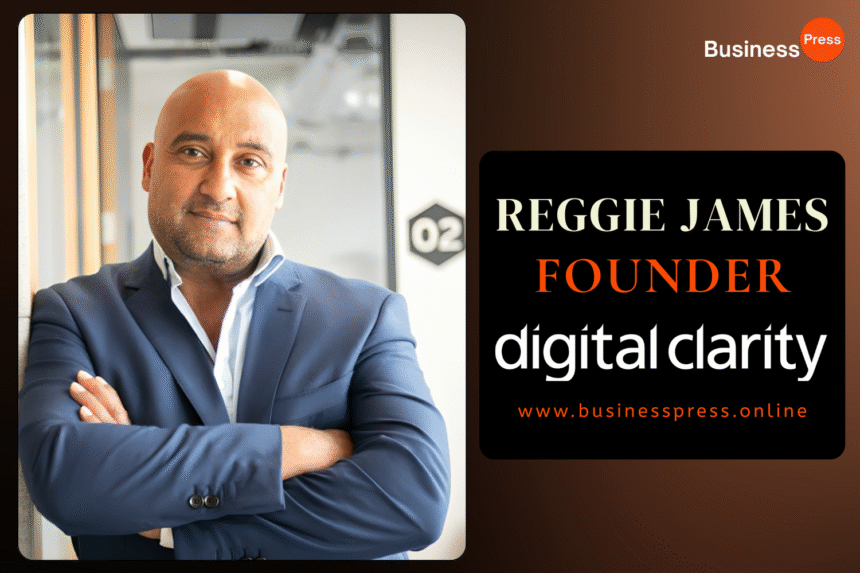A distinguished professional, Reggie James brings over 25 years of experience in digital strategy, AI-marketing, and the GTM consulting landscape. As the founder of Digital Clarity, and Director of DBMM Group, Reggie James has played an instrumental role in executing high-impact marketing and GTM strategies at a wide variety of organizations, from startups to Fortune 500 companies. As we dive deep into the interview, Reggie shares the journey, visions, and plans for the company and the industry alike.
The Beginning
We started the interview by asking Reggie James’ origin story, “How did you get here?”
Reggie shared, “I’ll be honest, I didn’t wake up one day thinking of starting a go-to-market consultancy. That’s the LinkedIn version, but the real version is messier.
I spent years watching brilliant tech companies completely botch their market entry. I’m talking about products that should have dominated their space, run by smart people, backed by serious money and they’d launch with positioning that made no sense, messaging that their own sales team didn’t understand, and pricing that seemed pulled from thin air.
I have built and exited 2 startup tech businesses in Singapore and London. Before launching Digital Clarity, I held operations and strategy roles, spending time in both scale-ups and more established companies, including Ziff Davis, VNU, and AltaVista (now Yahoo!). But honestly, the real education came from watching expensive failures and asking – Why does this keep happening?”
“Digital Clarity came from a simple frustration: companies were leaving massive amounts of money on the table because they don’t treat go-to-market as a strategic discipline. They either copy what competitors are doing or they wing it, and both approaches are terrible.
Companies would invest in product development, then treat the go-to-market strategy like an afterthought. Like you could just ‘figure it out’ once the product was ready. It drove me nuts. Digital Clarity is a wholly owned subsidiary of DBMM Group, where I am COO,” he added.
Current Offerings at Digital Clarity
Intrigued to learn more about the offerings at Reggie James’ venture, we asked, “So what does Digital Clarity actually do?”
He explained, “We help tech companies not screw up their market entry and growth strategy. More specifically: we work with B2B tech companies, usually between £5M-£100M in revenue, sometimes earlier if they’re well-funded, who are at a critical juncture. Maybe they’re launching a new product, expanding to a new market or vertical, or normally, their growth has stalled and they can’t figure out why.
We don’t run your ads, build your website, or manage your CRM. There are plenty of agencies for that. What we do is the strategic thinking that sits underneath all of that:
- Who exactly are you selling to, and why should they care? Sounds simple. Most companies get this wrong.
- What’s your actual competitive advantage? Not what you think it is. What customers actually choose you for.
- How should you price? Most tech companies either undercharge because they lack confidence or overcharge because they think ‘enterprise’ means expensive.
- What’s your revenue model? PLG, Sales-led, or Partner-driven; most companies try to do everything and end up doing nothing well.
- How do you enter a new market without burning cash? There’s a disciplined way to do this. Most companies don’t follow it.
We typically work with clients for 6 to 18 months, embedded with their leadership team. We’re not PowerPoint consultants; we’re in the trenches helping them make decisions, build plans, and actually execute. Our clients are primarily UK, European and US tech companies. We’re particularly strong in SaaS, deep tech B2B, Fintech, and generally tech companies looking to scale.”
Read more: Shaping The Future: Empowering Female Leaders | Marissa Cherepanov
Success as an Efficient Leader
We further asked, “What makes a good leader in tech strategy?”
Reggie commented, “The best leaders I’ve worked with, and I include clients here, not just people I admire from afar, share a few traits that you don’t see on motivational Instagram posts. They’re intellectually honest, can say ‘I don’t know’ without ego getting in the way, and can admit when something isn’t working. This sounds obvious but it’s shockingly rare, as most leaders would rather defend a failing strategy than admit uncertainty.
Also, they ask better questions than they give answers. The leaders who impress me most don’t have all the answers. They ask questions that reframe the problem entirely. Moreover, they understand their business model at a molecular level. They know their unit economics, what drives customer lifetime value, where they make money, and where they lose it. You’d be amazed at how many leaders can’t answer basic questions about their own business economics.”
“Another defining trait is that they’re comfortable being unpopular. Good strategy often means saying no to things that seem like obvious opportunities. It means making trade-offs. The best leaders can absorb the criticism that comes with clear choices. Good leaders can even move fast on decisions, slow on commitments. They’ll make a call with incomplete information and adjust as they learn, but don’t make big strategic commitments lightly. There’s a difference between agility and impulsiveness.
What I don’t value is ‘thought leadership’ when it’s just repackaged common sense. Leaders who optimize for being quoted rather than being effective, or people who confuse activity with progress,” Reggie added.
Adaptability Amidst the Digital Revolution
The technological advancements have been reshaping businesses across industries. To learn more about this aspect from Reggie James, we asked, “How has AI changed what you do?”
Reggie responded, “We are also AI consultants. AI has changed everything and nothing.
The tools we use for research, competitive intelligence, and market analysis are completely transformed. We can process customer interview transcripts, analyze competitor positioning, and identify market patterns at a scale that would have required a team of analysts three years ago. I use AI daily: for research synthesis, exploring strategic scenarios, or for challenging my own thinking. On my podcast, I’ve spent a lot of time exploring how AI is reshaping marketing and growth strategy because it’s the most significant shift I’ve seen in my career.”
He continued, “But here’s the nothing part: AI is terrible at actual strategic thinking. It can give you information, but it can’t tell you what it means for your specific situation. It can’t make the judgment calls that define strategy. For instance, we worked with a client who’d used AI to analyze their market positioning. The AI gave them a perfectly reasonable set of recommendations that looked like every other company in their space — generic, safe, and forgettable.
The actual insight, the strategic choice that made them different, came from a 90-minute conversation where we challenged their assumptions about who their real competitor was. It turned out they were competing with spreadsheets and manual processes, not the other software vendors they were obsessed with. That realization changed everything about their positioning and messaging.
AI helped us get there faster, but it couldn’t make that leap. The companies winning right now are the ones using AI to augment human judgment, not replace it. The ones losing are either ignoring AI entirely or assuming AI can do their strategic thinking for them.”
Insights of an Expert
Addressing the aspiring professionals in his field, we asked Reggie James, “What would you tell someone starting out in this field?”
He responded, “Three things, and they’re probably not what you expect. Firstly, get close to revenue early in your career. Don’t spend years in strategy roles where you never talk to customers or see whether your brilliant ideas actually make money. The best strategists I know spent time in sales, account management, or customer success. They understand how business actually works, not how it works in theory. If you’re early in your career, volunteer for customer calls. Shadow the sales team, ask to see the P&L, learn how your company actually makes money, and where it struggles.
Secondly, develop a point of view, even if you’re wrong. Take positions, make predictions, be willing to be wrong in public, and that’s how you learn and become interesting. I started my podcast not because I had everything figured out, but because I wanted to explore ideas and have conversations with smart people. Some of my takes aged poorly, but the process of developing and testing perspectives is what truly matters.”
“Thirdly, understand that most career advice is survivorship bias – including mine. The path that worked for me might be completely wrong for you. The successful people giving advice often don’t know which parts of their success came from skill, luck, or timing.
So take advice, including this – as data points, not instructions. Your job is to figure out what’s true for you. The practical stuff: learn to write clearly, get comfortable with data, understand business models, and build real relationships. But honestly, curiosity, and intellectual honesty will take you further than any specific skill, and as Rob Begg says – Heartfelt growth,” Reggie added.
What’s next for Digital Clarity
To learn more about the plans Reggie James has set for his business, we asked him to share them.
He explained, “We’re doubling down on the AI go-to-market challenge. The deeper question is, how does AI fundamentally change what a good go-to-market strategy looks like?
The answer is, enter the Digital Clarity Intelligence Engine (DCIE). It is AI-powered intelligence for B2B companies whose go-to-market is broken. Think of it this way: you’ve got all the pieces – CRM data, sales calls, customer feedback, marketing tools, but nobody’s connecting the dots, or telling you why deals are stalling, what messaging actually works, or which prospects will actually close.
You get the AI doing the heavy analysis. You get the proven methodology we’ve used to deliver 60%+ ARR growth for clients. Importantly, you get actual humans who’ve done this hundreds of times, guiding you through it.”
Reggie added, “We’re also being more selective about clients. We used to take on projects that were fine but not fascinating. Life’s too short. Now we’re focused on working with companies solving interesting problems with leaders who genuinely want to build something meaningful.
And personally, I’m investing more time in the podcast and writing because I believe the best way to refine your thinking is to share it publicly and get it challenged.”
The Strategy for Guaranteed Success
Lastly, we asked, “What do most people get wrong about go-to-market strategy?
Reggie commented, “They think it’s about tactics, it’s not. Go-to-market strategy is about making clear choices: Who are we for? What problem do we solve better than anyone else? What are we not trying to be?
Most companies want to be everything to everyone. They want every possible customer segment. They want to compete in every possible dimension. They want to keep all their options open. That’s not a strategy – that’s the absence of strategy.
The companies that win make hard choices. They say no to good opportunities because those opportunities don’t align with their strategy. They’re willing to alienate some customers to be invaluable to others.
That’s uncomfortable and feels risky. But it’s the only way to build something that matters. The tactics, the channels, the campaigns, the messaging frameworks – those all flow from the strategic choices. Get the strategy right, and the tactics become obvious. Get the strategy wrong, and no amount of tactical excellence will save you.”
Connect with Reggie James:
LinkedIn: https://uk.linkedin.com/in/reggiejames
Digital Clarity: https://digital-clarity.com
Spotify: https://open.spotify.com/show/6yvvIVmLK92YjQd7DsHoqg
Substack: https://substack.com/@reggiejames/note/p-174510307
Medium: https://reggie-james.medium.com
Also Read :- Dr. Fred DiDomenico: From Chiropractic Expert To Global Inspiration





